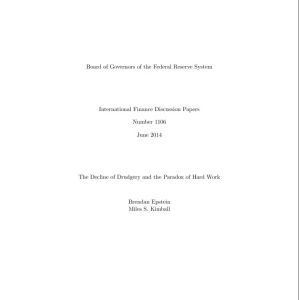Join getAbstract to access the summary!

Join getAbstract to access the summary!
Brendan Epstein and Miles S. Kimball
The Decline of Drudgery and the Paradox of Hard Work
Federal Reserve Board, 2014
What's inside?
If you could work fewer hours, would you?
Recommendation
Some people love their jobs, but most can’t wait for the weekend, for a holiday or for retirement. It might seem strange that, given the chance to work less, individuals would opt to work just as much. Citizens of OECD countries have worked roughly the same amount of hours since the mid-1950s, despite rising wages and consumption. If they can live as well on less time at work, why don’t they? The answers are complex – and the theory and mathematics rather dense – in this report from economists Brendan Epstein and Miles S. Kimball. getAbstract suggests their erudite investigation into why people toil to working men and women everywhere.
Summary
About the Authors
Brendan Epstein is an economist with the Board of Governors of the Federal Reserve System. Miles S. Kimball is a professor of economics at the University of Michigan.

















Comment on this summary